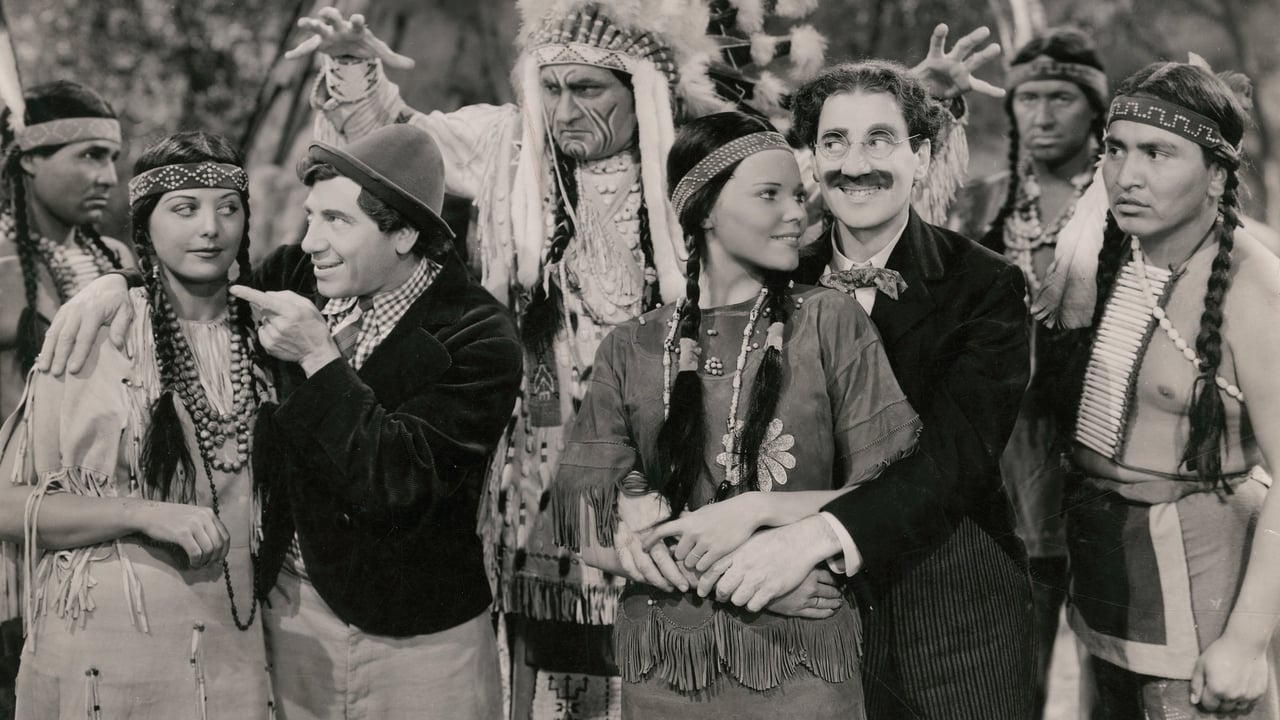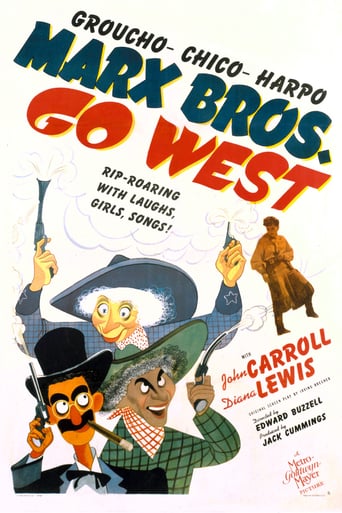

Basically , a highly farcical treatment of one chapter in the building of the first transcontinental railroad. This is confirmed by the parting scene, which is a farcical recreation of the pounding of the golden spike at Promontory Point, UT. The choosing of this topic for a plot may have been influenced by De Mille's epic: "Union Pacific" , released the previous year. It also appears to have been influenced by Keaton's "The General". Especially, for Marx Brothers fans, this is certainly worth a look. Initially, Chico and Harpo are going West(specifically the gold rush center of Cripple Creek, CO) to find gold or perhaps fleece those who have found it. Simultaneously, embezzler and all around con man Groucho is heading west to practice his vocation. Chico and Harpo's cheating of Groucho during the exchange of money for items is a riot. When Groucho goes to the train ticket window, he quips "That's highway robbery. No wonder you're behind bars". Later, when taking a stagecoach, "the 3 jerks" create havoc among the male and female passengers. The plot is mainly about the disposition of the deed to a plot of land: Dead Man's Gulch, considered worthless because no gold has been found on that land. However, it has suddenly become very valuable, as the railroad has decided it is the key to the most practical route over the Rockies. This deed gets passed around as collateral for IOUs or is stolen. The boys attempt to foil an attempt by crooks to cash in on the deed. There are a number of musical interludes. Lulubelle sings "You Can't Argue with Love" on stage. Eve sings "Beautiful Dreamer" alone in her house.. While leisurely riding horses, John Carroll(as Terry Turner) leads the singing of "Riding the Range". Harpo plays the harp and Chico plays the piano in the saloon. I think the segment involving a visit to an Indian reservation could have been deleted as irrelevant to the plot. Besides, there are too many erroneous "Hollywood Indian" clichés. Ugh. However, Harpo does improvise a harp out of a loom, and the chief accompanies him with a flute.The climactic last segment involving "the great locomotive chase"(with apologies to Fess Parker and Disney) is what most people remember about this film. I can see that the whole thing would probably be hilarious to children. It could be almost as effective in a silent film.In being totally silent(except for his horn), Harpo mimics the traditional circus clown and some clowns of silent films. But unlike the latter and often the former, he has distinctive charismatic talking companions and others to greatly expand the possibilities of the total comedy experience. As in this film, we can complement the comedy with singing, instrumental music, and dance, only possible to a rudimentary level in silent films. Unfortunately, many reviewers seem to see the musical interludes as wasted time between comedy, which they may be in some instances, but not all.
... View MoreThis was the second Marx Brothers movie written by Irving Brecher and directed by Edward Buzzell, after At the Circus. As such, both were full of very funny Marx routines and had many visual gags to match. The beginning with Grouch and Harpo and Chico doing money exchanges is one of the funniest in their career. The train chase at the end was also very funny with some Buster Keaton-esque flavor which shouldn't be surprising as the Stone Face reportedly contributed some of those gags. Once again, it's great seeing Chico playing the piano (with an apple-or orange-he took from Harpo during some of that) and Harpo playing the harp (performing "The Land of Sky Blue Waters" which I didn't recognize as the Hamms beer commercial song since it sounded different here). Oh, and Groucho plays the guitar here, something he didn't do since Horse Feathers, as well as sing a few lines with Chico during a number by one of the romantic leads, John Carroll. Nothing more to say except, I recommend Go West. Actually, I think that was regular screen drunk Arthur Housman in the saloon sequence with Groucho and Harpo which I also enjoyed.
... View MoreDespite not having a reputation as one of the better Marx Brothers films, I still found this to be a typical MB movie with crazy scenes and a few songs. No, it may not have been as funny as their better-known films of the 1930s, but I didn't think it much below them, either. It's not as totally outrageous as the boys' earlier stuff but it also has fewer stupid stuff, too. Make no mistake: it has its share of genuinely funny material, both in dialog and in sight gags. The finale is a wild chase scene on a train that is very, very entertaining. That holds true for a wild stagecoach ride earlier in the picture. Once again, Chico comes up with the funniest lines.I think this is a solid comedy and an underrated Marx Brothers film . If you like "the boys" in their more well-known films, don't pass this one by.
... View MoreThe sad fact about the Marx Brothers is that after the movie A NIGHT AT THE OPERA, their career was all downhill. While A DAY AT THE RACES and ROOM SERVICE were still very good, their subsequent efforts were painfully ordinary and generally unfunny compared to their early zany work. It was like they were playing lethargic caricatures of themselves. And, from what I gathered, the Marxes WERE very content to just collect a paycheck at this point in their lives. This film is a little better than THE BIG STORE and AT THE CIRCUS--two surprisingly bland efforts from the same time period by the comedy team.Some of the blame for the static nature of this film also must be given to MGM--a studio that had a history of ruining good comedians when they came under DIRECT MGM control (Laurel and Hardy's films were distributed by MGM but were created by the independent-minded Hal Roach Studios). If you don't believe me, look at all the Marxes films from the late 30s on as well as Buster Keaton's films of the 30s--they rely on an MGM formula and lack all the frenetic intensity of the comedians' earlier non-MGM efforts. The film is a by-the-book effort where the Marx Brothers travel west in search of fun and adventure. Soon, the three get pulled into a land deal and they get cheated by the saloon owner, Baxter (Robert Barrat). So, much of the rest of the film is spent trying to get back the deed for this property. In addition, there is a needless romance John Carroll and Diana Lewis. Useless because folks who go to see Marx Brothers films really don't want romance--unless it involves Groucho or Harpo chasing women. Overall, not an unpleasant film but as for the comedy, it was amazingly muted. Among the best moments were when Groucho and his brothers kept trying to cheat each other as well as the climactic train ride. And, among the worst was the American Indian portion--which was long, unfunny and irrelevant to the film. By the way, what happened to grandpa (Tully Marshall)? He just disappeared from the film and at one point someone asked where he was...but this character who was important to the plot just vanished.
... View More